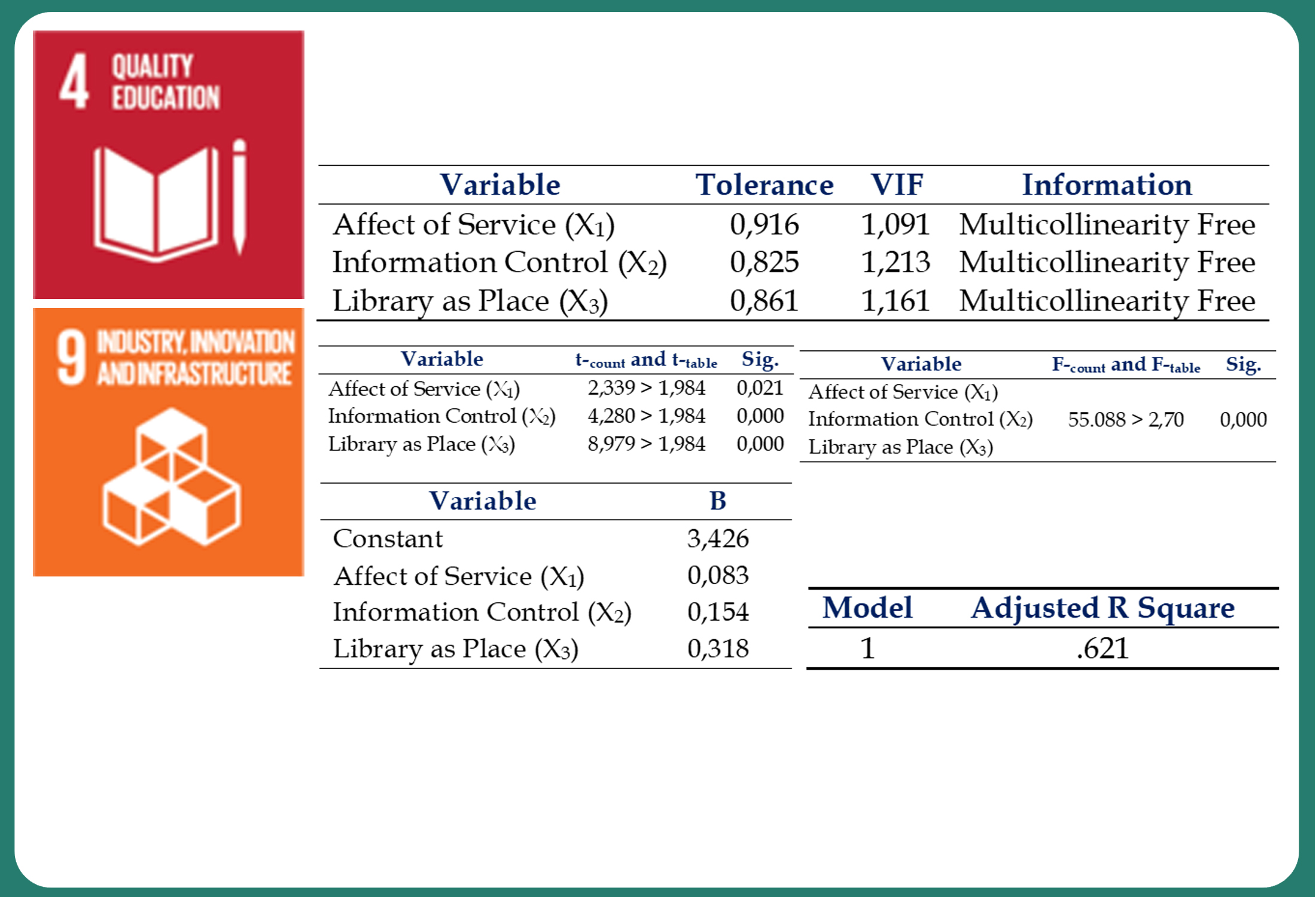Analysis of User Satisfaction with the Digital Scientific Work Catalog System Using the LibQUAL+ Framework
DOI:
https://doi.org/10.24036/javit.v5i2.250Keywords:
User Satisfaction, Digital Library Services, LibQUAL ®, Service Quality, Academic Libraries, Scientific Work CatalogAbstract
This study investigates user satisfaction with the digital Scientific Work Catalog Information System at Padang State University Library through the application of the LibQUAL+® methodology. The assessment focuses on three core service quality dimensions: Affect of Service, Information Control, and Library as Place. Service quality in academic libraries is a critical determinant of user satisfaction, and understanding its components is essential for guiding future service improvement and innovation. A quantitative approach was employed involving 100 library users, with data collected via structured questionnaires and analyzed using multiple linear regression. The findings reveal that all three dimensions significantly and positively influence user satisfaction, both individually and collectively. Among them, Library as Place demonstrated the strongest effect, emphasizing the continued relevance of physical infrastructure even within digital service environments. These results highlight the strategic need for academic libraries to adopt integrated management approaches that combine technological development, infrastructure enhancement, and staff capacity building. The study contributes to the limited body of research on digital service quality in Indonesian academic libraries and offers a robust empirical model for evaluating user-centered service design. Future research is recommended to explore additional factors such as system usability, cross-institutional validation, and correlations with academic performance using learning analytics.
Downloads
References
M. A. Mohamed Hashim, I. Tlemsani, and R. Matthews, “Higher education strategy in digital transformation,” Educ. Inf. Technol., vol. 27, no. 3, pp. 3171–3195, Apr. 2022, https://doi.org/10.1007/s10639-021-10739-1.
F. M. AlQhtani, “Knowledge Management for Research Innovation in Universities for Sustainable Development: A Qualitative Approach,” Sustain., vol. 17, no. 6, p. 2481, Mar. 2025, https://doi.org/10.3390/su17062481.
Y. Wan et al., “Making knowledge graphs work for smart manufacturing: Research topics, applications and prospects,” J. Manuf. Syst., vol. 76, pp. 103–132, Oct. 2024, https://doi.org/10.1016/j.jmsy.2024.07.009.
S. Tariq, M. Baruwal Chhetri, S. Nepal, and C. Paris, “Alert Fatigue in Security Operations Centres: Research Challenges and Opportunities,” ACM Comput. Surv., Apr. 2025, https://doi.org/10.1145/3723158.
A. Lloyd, “The Qualitative Landscape of Information Literacy Research,” Qual. Landsc. Inf. Lit. Res., pp. 1–256, 2021, https://doi.org/10.29085/9781783304073.
P. Peciuliauskiene, G. Tamoliune, and E. Trepule, “Exploring the roles of information search and information evaluation literacy and pre-service teachers’ ICT self-efficacy in teaching,” Int. J. Educ. Technol. High. Educ., vol. 19, no. 1, pp. 1–19, Dec. 2022, https://doi.org/10.1186/s41239-022-00339-5.
T. Svensson, J. Wilk, and K. Gustafsson Åman, “Information literacy skills and learning gaps– Students’ experiences and teachers’ perceptions in interdisciplinary environmental science,” J. Acad. Librariansh., vol. 48, no. 1, p. 102465, Jan. 2022, https://doi.org/10.1016/j.acalib.2021.102465.
C. M. Chen, M. C. Li, and Y. T. Chen, “The effects of web-based inquiry learning mode with the support of collaborative digital reading annotation system on information literacy instruction,” Comput. Educ., vol. 179, p. 104428, Apr. 2022, https://doi.org/10.1016/j.compedu.2021.104428.
J. Guo and J. Huang, “Information literacy education during the pandemic: The cases of academic libraries in Chinese top universities,” J. Acad. Librariansh., vol. 47, no. 4, p. 102363, Jul. 2021, https://doi.org/10.1016/j.acalib.2021.102363.
S. H. Batool, A. ur Rehman, and I. Sulehri, “The current situation of information literacy education and curriculum design in Pakistan: a discovery using Delphi method,” Libr. Hi Tech, vol. 40, no. 6, pp. 1705–1720, Dec. 2022, https://doi.org/10.1108/LHT-02-2021-0056.
B. MAGAJİ ABUBAKAR, “Library and Information Science (LIS) Education in Nigeria: Emerging Trends, Challenges and Expectations in the Digital Age,” J. Balk. Libr. Union, vol. 8, no. 1, pp. 57–67, Jun. 2021, https://doi.org/10.16918/jblu.932134.
C. M. Chu et al., “IFLA Guidelines for Professional Library and Information Science (LIS) Education Programmes.” International Federation of Library Associations and Institutions (IFLA), 2022. Accessed: Jul. 03, 2025. [Online]. Available: https://repository.ifla.org/handle/123456789/1987.
E. Abad-Segura, F. J. Castillo-Díaz, A. Batlles-delaFuente, and L. J. Belmonte-Ureña, “The Impact of Sustainable Technologies on Business Strategy and Competitiveness,” Environ. Footprints Eco-Design Prod. Process., vol. Part F120, pp. 103–130, 2025, https://doi.org/10.1007/978-3-031-81029-9_6.
A. Amin, M. R. I. Bhuiyan, R. Hossain, C. Molla, T. A. Poli, and M. N. U. Milon, “The adoption of Industry 4.0 technologies by using the technology organizational environment framework: The mediating role to manufacturing performance in a developing country,” Bus. Strateg. Dev., vol. 7, no. 2, p. e363, Jun. 2024, https://doi.org/10.1002/bsd2.363.
M. Huebner, L. Bond, F. Stukes, J. Herndon, D. J. Edwards, and G. M. Pomann, “Developing partnerships for academic data science consulting and collaboration units,” Stat, vol. 13, no. 1, p. e644, Jan. 2024, https://doi.org/10.1002/sta4.644.
A. Zulfiqar and A. Khalid, “When library cares: mining insights from LibQUAL+ to determine university students’ priorities,” Perform. Meas. Metrics, vol. 25, no. 3/4, pp. 143–161, Nov. 2024, https://doi.org/10.1108/PMM-11-2022-0037.
A. Iqbal and I. Hussain Asad, “Mapping Library Users’ Loyalty through LibQUAL +: Mediating Role of Users’ Satisfaction,” J. Libr. Adm., vol. 63, no. 3, pp. 402–420, 2023, https://doi.org/10.1080/01930826.2023.2177930.
S. A. Malik, T. Fatima, Y. Jia, and H. Pannu, “The influence of library service quality, library image, place, personal control and trust on loyalty: the mediating role of perceived service value and satisfaction,” Int. J. Qual. Reliab. Manag., vol. 41, no. 4, pp. 1111–1129, Mar. 2024, https://doi.org/10.1108/IJQRM-05-2023-0167.
M. J. Alam and M. Mezbah-ul-Islam, “Impact of service quality on user satisfaction in public university libraries of Bangladesh using structural equation modeling,” Perform. Meas. Metrics, vol. 24, no. 1, pp. 12–30, Feb. 2023, https://doi.org/10.1108/PMM-06-2021-0033.
K. R. Memon et al., “Management of knowledge and competence through human resource information system—A structured review,” Front. Psychol., vol. 13, p. 944276, Oct. 2022, https://doi.org/10.3389/fpsyg.2022.944276.
R. Rasheed and A. Rashid, “Role of service quality factors in word of mouth through student satisfaction,” Kybernetes, vol. 53, no. 9, pp. 2854–2870, Aug. 2024, https://doi.org/10.1108/K-01-2023-0119.
M. Al-Shafei, “Navigating Human-Chatbot Interactions: An Investigation into Factors Influencing User Satisfaction and Engagement,” Int. J. Hum. Comput. Interact., 2024, https://doi.org/10.1080/10447318.2023.2301252.
T. Rasheed and S. Ahmed, “Online information retrieval self-efficacy of library professionals: a predictor of patrons’ satisfaction in university libraries,” Digit. Libr. Perspect., vol. 40, no. 2, pp. 264–281, May 2024, https://doi.org/10.1108/DLP-12-2023-0108.
N. H. Kaapu and A. N. Zimu-Biyela, “Using LibQUAL to assess user satisfaction with library services at the Aloe Park South African Police Service (SAPS) National Library, Pretoria, South Africa,” Libr. Manag., vol. ahead-of-p, no. ahead-of-print, 2025, https://doi.org/10.1108/LM-11-2024-0121.
Q. Yang, Z. Sen Wang, K. Feng, and Q. Y. Tang, “Investigating the crucial role of logistics service quality in customer satisfaction for fresh e-commerce: A mutually validating method based on SERVQUAL and service encounter theory,” J. Retail. Consum. Serv., vol. 81, p. 103940, Nov. 2024, https://doi.org/10.1016/j.jretconser.2024.103940.
D. I. A. I. S. Dr. Arif Rachman, Dr. E. Yochanan, Dan r & d, no. January. 2024.
K. A. Barfi, S. K. Parbie, C. K. Filson, M. V. Teye, K. Kodua-Ntim, and E. Ayensu, “Assessing the quality of services at an academic library,” Heliyon, vol. 9, no. 12, p. e22449, Dec. 2023, https://doi.org/10.1016/j.heliyon.2023.e22449.
G. R. Devi and D. Bhatt, “‘A Comprehensive Study On Library Service Quality: Bridging User Perception Gaps And Implementing Effective Improvement Strategies,’” Libr. Prog. Int., vol. 44, no. 3, pp. 304–315, 2024, Accessed: Jul. 03, 2025. [Online]. Available: https://openurl.ebsco.com/contentitem/eue:180917244?sid=ebsco:plink:crawler&id=ebsco:eue:180917244&crl=c.
Y. Fu, E. Lomas, C. Inskip, and J. Bunn, “Understanding international users’ library experience in the Digital Age – joining the behavioral and experiential aspects,” J. Doc., vol. 79, no. 3, pp. 608–634, Apr. 2023, https://doi.org/10.1108/JD-02-2022-0035.
A. Westby, “The Hybrid Workspaces of University Students : A qualitative study of student perception of medias uses in educational workspaces in relation to gender.,” Dissertation, 2024, Accessed: Jul. 03, 2025. [Online]. Available: https://urn.kb.se/resolve?urn=urn:nbn:se:kau:diva-100803.
M. Gunarathna, “Student Satisfaction with Physical and Digital Library Facilities in Higher Education Institutes,” Ann. Libr. Inf. Stud. , vol. 71, no. 2, pp. 190–199, Jun. 2024, https://doi.org/10.56042/ALIS.V71I2.7349.
J. N. Sheth, V. Jain, and A. Ambika, “Designing an empathetic user-centric customer support organisation: practitioners’ perspectives,” Eur. J. Mark., vol. 58, no. 4, pp. 845–868, Apr. 2024, https://doi.org/10.1108/EJM-05-2022-0350.
A. U. Khan, M. Rafi, Z. Zhang, and A. Khan, “Determining the impact of technological modernization and management capabilities on user satisfaction and trust in library services,” Glob. Knowledge, Mem. Commun., vol. 72, no. 6–7, pp. 593–611, Jul. 2023, https://doi.org/10.1108/GKMC-06-2021-0095.
J. Qiu, Z. Xu, H. Luo, J. Zhou, and Y. Zhang, “User experience of digital science and education evaluation platform: identification and analysis of key influencing factors,” Libr. Hi Tech, vol. 42, no. 6, pp. 1839–1862, Nov. 2023, https://doi.org/10.1108/LHT-10-2022-0468.

Downloads
Published
How to Cite
Issue
Section
License
Copyright (c) 2025 Miftahul Jannah, Asrul Huda, Muhammad Adri, Dedy Irfan

This work is licensed under a Creative Commons Attribution 4.0 International License.










